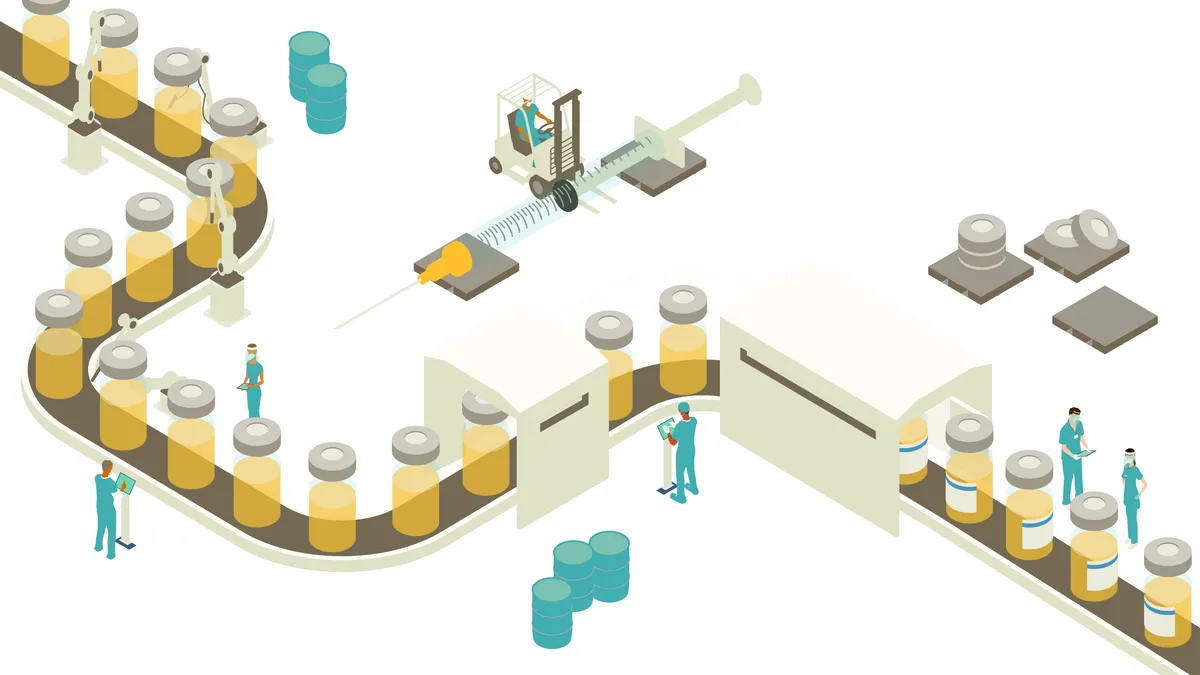In 2022, mounting economic fears led to a cautious M&A environment — and although many of those concerns persist into 2023, some areas are likely to attract the bulk of the industry’s attention and might be too irresistible to pass up as dealmaking heats up.

M&A spending dropped last year due to myriad underlying causes such as inflation, fears of a recession and drug pricing reforms passed as part of the Inflation Reduction Act, said Amanda Micklus, a senior pharma consultant for Citeline.
“There were difficult-to-access public markets for biotech companies,” she said. “The aggregate dollar value of M&A in 2022 was $87 billion.”
That number fell short of the $153 billion companies spent in 2021 — which itself was considered a stagnant performance over prior years. But the restrained M&A investment last year puts many companies in the position to spend in 2023.
“I think a lot of the larger pharma companies are actually sitting on a lot of cash on their balance sheet,” Micklus said. “So, they have power to buy companies.”
And if companies decide to open their wallets after the multi-year M&A drought, a few areas will likely draw the most interest, Micklus said.
Cutting-edge science on the table
One of these areas is advanced molecular therapies, which includes cell, gene and RNA therapies. Gene editing has taken major strides in recent years, and 2023 could see the approval of the first CRISPR-based medicine, exagamglogene autotemcel (exa-cel), to treat two rare blood disorders. The drug is the product of a partnership between Vertex Pharmaceuticals and CRISPR Therapeutics, Micklus said.
“CRISPR Therapeutics itself could be an acquisition target,” she added.
Interest in in vivo gene editing has also ticked up. In 2022, several pharma giants formed ties with companies in the burgeoning field.
“This could be the year that Genmab is actually acquired."

Amanda Micklus
Senior pharma consultant, Citeline
“Bayer, Pfizer, Novartis — they all did pretty big deals in in vivo gene editing,” Micklus said. Intellia Therapeutics has a promising in vivo gene editing candidate called NTLA 2001 in the pipeline, giving it some appeal as a potential acquisition target too, Micklus said.
Non-viral gene delivery methods are getting a look as well.
“I think non-viral gene delivery is going to be an area that sees increased investment and potentially M&A,” Micklus said, pointing out that many companies are looking for alternatives to gene therapy delivered by viral vectors, which bring safety and manufacturing challenges.
“One of the biggest series A rounds in this advanced molecular therapy area went to a company called SonoThera — they’re using ultrasound microbubbles to deliver gene therapy,” she said.
The diseases driving M&A interest
Oncology, a perennial favorite, will likely remain a top M&A target area. Of particular interest are newer antibody technologies such as antibody-drug conjugates, bispecific antibodies and tri-specific antibodies, Micklus said. A leader in this area is Europe’s Genmab with a highly anticipated bi-specific antibody called epcoritamab, developed through a partnership with AbbVie with an expected launch in 2023.
“This could be the year that Genmab is actually acquired,” she said.
Cardiology, obesity and ophthalmology drugs are also of interest, Micklus said. Two companies that might be M&A targets are Apellis Pharmaceuticals, which is on track to gain approval in 2023 for the first treatment for geographic atrophy, an advanced form of dry age-related macular degeneration; and Cytokinetics, a muscle biology pharmaceutical company with a cardiac myosin inhibitor in phase 3 to treat hypertrophic cardiomyopathies, a thickening of the heart muscle.
Large pharma companies might also have an eye out for small outfits working on obesity drugs that could help them compete with the success of Eli Lilly’s Mounjaro and Novo Nordisk’s Wegovy, Micklus said. One potential acquisition target might be a clinical-stage biopharma called Altimmune, which is expecting phase 2 data from an obesity drug called pemvidutide, Micklus said.
Ultimately, as the uncertainty of the last few years has shown, the real prospects for 2023 M&A remain unclear. But one thing is certain: There are plenty of opportunities for companies on the hunt.












